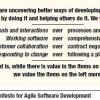|
|
Effort Tracking Made Easy Tracking effort is often a difficult cultural change to implement. Projects working toward Capability Maturity Model (CMM) Level two behaviors struggle with effort tracking for many reasons, including tool restrictions, resistance, and complicated processes. Lynn Cole shares insight and techniques that she has both successfully implemented and seen implemented by others. Discover the simple steps that you can take to start capturing and using effort data about a project.
|
Lynn Cole, Spherion Technology Architects
|
|
|
A Disciplined Approach to High Velocity Software Development When faced with the challenge of shortening delivery cycles, the old economy manufacturing companies utilized disciplined quality techniques to reduce scrap and rework and improve productivity. Software developers in the new economy face a similar challenge to accelerate development to meet critical time-to-market business goals brought about by the Internet. Unfortunately, many are abandoning disciplined methods in lieu of a risky "hack and test" approach with potential disastrous consequences for customers and developers. Learn of one company's transformation from ad hoc development to a disciplined and quantitatively managed enterprise. Discover why such a transformation is absolutely essential for high velocity software development.
|
Girish Seshagiri, Advanced Information Services, Inc.
|
|
|
The Ritual of Retrospectives: Your First Best Tool for a Learning Organization You've just finished your software release. You have signed off, and it's been shipped. You're done, right? No! The moment a project ends is the perfect time to reflect on the entire project to see what there is to learn-the unique moment when the project can be viewed in its entirety. You can look at the completion of your project as having "paid your tuition." So, now what are you going to learn from it? In this presentation, Norm Kerth explores the benefits, pitfalls, and experiences with this project management tool. Explore ways to use retrospection to improve future projects in your organization.
|
Norm Kerth, Elite Systems
|
|
|
Manage the Risks and the Process Including a testing/QA component early in a software project necessarily prolongs the schedule, right? Not so, according to Ross Collard. In this, the third of a three-part series, Collard explains how to anticipate risks and to aggressively manage the process to prevent disaster.
|
|
|
|
Manage and Strengthen Testing Including a testing/QA component on a software project necessarily prolongs the schedule, right? Not so, according to Ross Collard. In this, the first of a three-part series, Collard explains how speed and quality assurance don't have to contradict each other. Read his examples of how testing can actually help reduce the time to market.
|
|
|
|
Can You Negotiate Quality? XP teams have the right to do their best work. On the other hand, customers have the right to specify and pay for only the quality they need. How does one reconcile two potentially conflicting points of view? Is quality negotiable? If so, how do we go about negotiating it? This paper will explore the following questions: Is quality negotiable? How can we negotiate quality? What are internal and external quality, and are either or both negotiable? What's the XP tester's quality assurance role? How far should testers go in helping the customer define acceptance criteria?
|
|
 |
Agile Development Technical Editor Brian Marick explains the values behind the Manifesto for Agile Software Development. Above all, Agile practitioners value: individuals and interactions; working software; customer collaboration; and responding to change.
|
|

